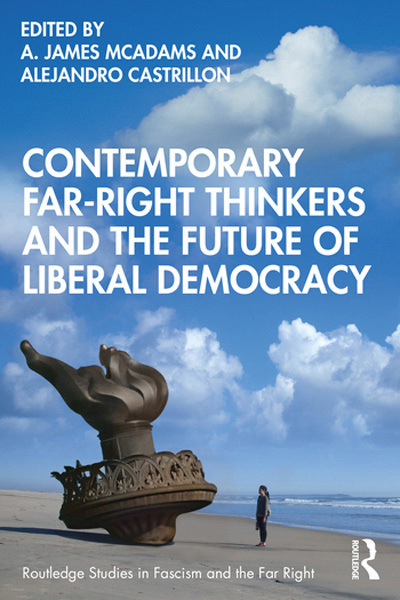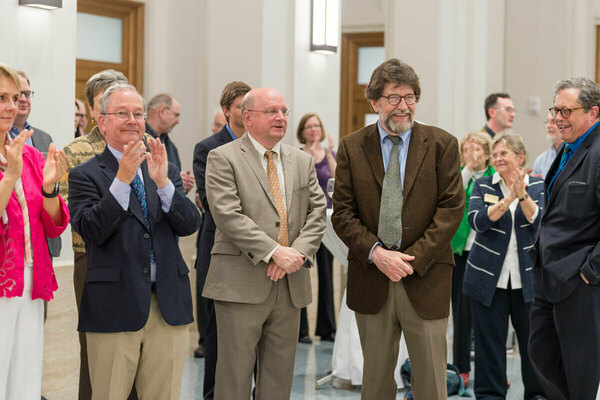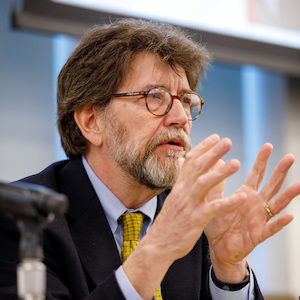
“5 Questions with … ” is a new series from Europe in the World (EITW) featuring short interviews with leading scholars and practitioners whose work directly speaks to the platform's key themes. For the first installment, A. James McAdams, William M. Scholl Professor of International Affairs at the University of Notre Dame, talked to us about his recent book, Contemporary Far-Right Thinkers and the Future of Liberal Democracy (Routledge, 2021, co-edited with Alejandro Castrillon).
The EITW Editors: Simply put, what is your book about? And what is the central point you make?
A. James McAdams: In our book, Alejandro Castrillon and I have sought to make sense of the new-found prominence of a coterie of contemporary far-right thinkers in Europe, America, and Australia. These are people who think of themselves as intellectuals and who are launching new forms of attack on liberal democracy, seeking to undercut it by using its own terms against it. A central argument I make in my contribution to the volume is that one cannot understand these people by simply imposing on them categories from the past—terms like fascism, Nazism, even white supremacy. If we call them fascists, as many scholars do, we are caught in a bind of thinking in terms of the European experience of the 1920s and 1930s. But this approach is misleading and unhelpful because the fascists of that time were operating in circumstances in which democracies were weak: they were under siege by many of the elites, and they had little experience with the benefits of liberal democratic institutions. In contrast, contemporary far-right thinkers are operating in an advanced democracy. If they simply used the old language of fascism, their followings would likely be much smaller. So what Alejandro and I do in the book is demonstrate how they are critiquing, attacking, and potentially undermining democracy in new ways. For example, if you take liberal democracy’s guarantee of equal rights for all, they make their case for the supremacy of majority rights—the rights of white Americans or white Europeans or Western civilization—by arguing that democracies, in practice, unfairly discriminate against them by prioritizing the protection of the rights of minorities. Thus, these thinkers turn the tables on liberal democracy by going after the system’s weaknesses.
Editors: What is one of the most surprising findings you encountered in your research for this book?
McAdams: One of the most notable findings is that you can find not only differences but also many similarities across regions and across continents. The subject of identity, in particular, is one that travels from the U.S. to Germany, to France, to Australia, and then back to the US. As a result, these contemporary far-right thinkers can speak to each other and then speak to broader societies in ways that are remarkably similar—although they of course have different emphases. Another interesting finding is the extent to which they have been able to use social media—and not just social media--but also conferences, workshops, publishing houses, books, talks, and various other forms of presentation—to speak to each other. They are extremely skilled in marketing their intellectual wares. For instance, some of these figures use these to profile their activities as radically libertarian forums for open-minded intellectuals to exchange views. What one might not see, unless one looks closely, is that they also publish pieces by people that argue that there are biologically superior and inferior races.

Editors: What novel perspective does your book or research provide on Europe’s political, social, or economic relations with the rest of the globe today?
McAdams: I think one of the most important things is that most of these far-right thinkers come from Western Europe, and the ideas are now spreading internationally. From the standpoint of the long-term impact of radical ideas, it is easier to delegitimize democracy if you are making the case from France or Britain or Germany than it is if you are making the case from a formerly communist or authoritarian country like Poland, Slovakia, or Serbia. So these thinkers are in a position to make the argument that what is at stake is Western Civilization, politics as we have understood it up to now, democracy, and so forth. And now these contemporary thinkers are returning to an attractive theme that hasn’t been around for a while, the idea of vanguard elites. They see themselves—and their writing reflects it—as enlightened individuals who are destined to lead the masses. Lenin would have been proud!
Editors: What are some additional works—by you or others—one can consult for further reading on these issues, or what recent works about Europe do you find particularly insightful or inspiring?
McAdams: Some recommendations include: Ronald Beiner’s Dangerous Minds: Nietzsche, Heidegger, and the Return of the Far Right (University of Pennsylvania Press, 2018); Jose Pedro Zuquete’s The Identitarians: The Movement against Globalism and Islam in Europe (University of Notre Dame Press, 2018); Far-Right Politics in Europe, by Jean-Yves Camus and Nicolas Lebourg (Harvard University Press, 2017); and Joe Mulhall’s fantastic Drums in the Distance: Journeys Into The Global Far Right (Icon Books, 2021). These works are written by people who know democratic theory, and they know the critiques. They also know the movements, know these people, go to their meetings, and talk with them.
Editors: Is there anything else you want people to know or want to tell our readership?
McAdams: I want them to think about why liberal democracy is in danger. I want them to understand that we need to recognize how people are able to take advantage of liberal democracy’s shortcomings to undermine it. For me, that’s the punchline. I also want to stress the importance of ideas and leaders, topics that political scientists largely ignore. If we do not study ideas and leaders, how can we understand the impact of a Gorbachav, Margaret Thatcher, or Donald Trump? For good or bad, these politicians’ ideas are what made their impact so tangible.
Further recommended reading on the subject
- “Getting It Right; The Role Of Intellectuals In Contemporary Far-Right Populism,” Ralph Bunche Institute Podcast Interview with Jim McAdams: https://ralphbuncheinstitute.org/2021/10/11/getting-it-right-the-role-of-intellectuals-in-contemporary-far-right-populism-with-jim-mcadams/.
- “A. James McAdams on Far-right Thinkers and Democracy,” an interview for the Illiberalism Studies Program of Institute for European, Russian, and Eurasian Studies (IERES) at George Washington University: https://www.illiberalism.org/a-james-mcadams-on-illiberal-democracy/?fbclid=IwAR2c_hOwU3DY9DZTNx-AnIwpEfeORPRsMXcLcdhGNHpscSN1FyA5bZdeD4w.
About the author

A. James McAdams is the William M. Scholl Professor of International Affairs at the University of Notre Dame. For 16 years, he was Director of the Nanovic Institute for European Studies. He has also served as chair of the Department of Political Science. McAdams has written widely on European affairs, especially on central Europe, as well as global communism. His books include East Germany and Detente (Cambridge University Press, 1985); Germany Divided (Princeton University Press, 1994); Judging the Past in Unified Germany (Cambridge University Press, 2001); and The Crisis of Modern Times (University of Notre Dame Press, 2007). His recent book, Vanguard of the Revolution: The Global Idea of the Communist Party (Princeton University Press, 2017), examines the political history of the party from the 1840s to the present. Covering a panoply of communist parties from Germany to Russia, China, Poland, North Korea, Cuba, and many others, the book is the first comprehensive international history of the communist party. Vanguard of the Revolution was named one of the Best Books of 2018 by Foreign Affairs. He has also recently published two collections: 1968: Cultural Revolutions in Europe and Latin America (with Anthony Monta, University of Notre Dame Press, 2021) and Contemporary Far-Right Thinkers and the Future of Liberal Democracy (with Alejandro Castrillon, Routledge, 2021).
Originally published by at eitw.nd.edu on November 29, 2021.